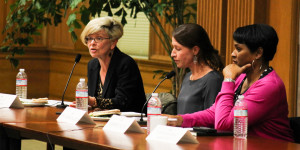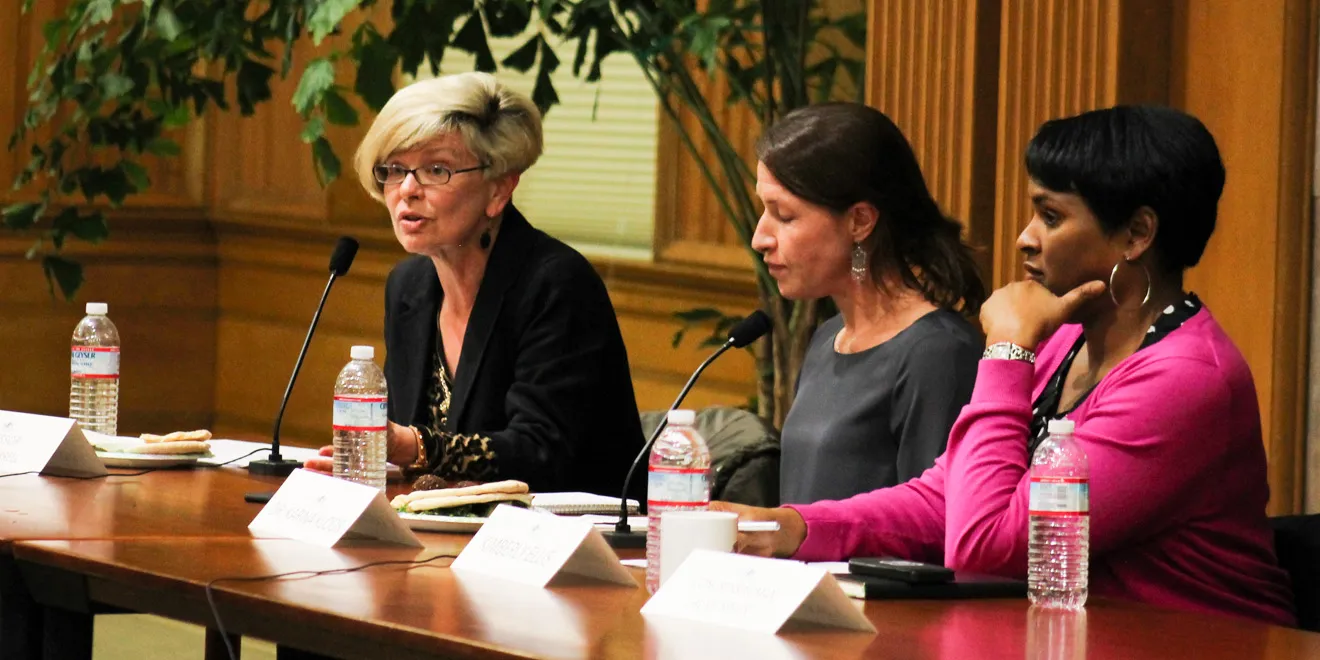
The Public Policy forum of Stanford in Government (SIG) hosted a panel Tuesday night on “Women in Policy” to discuss the startlingly low percentage of Congress that is female: 19.4 percent. The panel also brainstormed ideas to increase the number of women in Congress, and stickers passed out around campus to advertise the event read, “A Woman’s Place is in the House AND the Senate.”
The panel included Karina Kloos Ph.D. ’15, who just published the book “Deeply Divided,” which is about the extreme political division in our country; Kimberly Ellis, the executive director of Emerge California, an advocacy group aiming to get more democratic, pro-choice, progressive women elected; and Stanford professor of sociology Shelley Correll M.A. ’96 Ph.D. ’01 who moderated the discussion and currently teaches the Thinking Matters course Think 46: Why So Few? Gender Diversity and Leadership, which is about the disparity of women in leadership positions.
Congresswoman Jackie Speier also gave a short speech at the beginning of the event but was unable to stay for the panel. Speier explained that while the media may consider having 100 women in Congress is progressive, the percentages are still too low.
“It’s just not enough,” Speier said.
“There’s nothing amazing about having 20 percent of Congress being women when women make up more than 50 percent of the population,” she added.
Speier gave several examples of causes she has championed as a woman in Congress that are often overlooked by the majority of male leaders. Contraception, rape in the military and sexual assault on college campuses are just a few of the issues Speier has focused on.
“There’s not a day that goes by that I don’t have a dragon to slay,” Speier said. “But that’s how I know I’m making a difference.”
As the panel began, Correll and Ellis commented on the large number of male audience members and noted that the conversation should include men and women alike.
“It isn’t just a women thing,” Ellis said.
One of the first issues discussed was the reason that more women are not running for office. Ellis drew from her experience with Emerge California, which encourages and trains women in California to run for office.
“The top reasons why women don’t run for office are family reasons, the idea of fundraising and that politics is a dirty sport,” Ellis said.
She also cited “the confidence gap” and explained that women often see themselves as less qualified for the positions. According to Ellis, on average, women have to be asked about seven times to run for office before they consider the option.
“We as a society need to get in the habit of asking women to run for office,” Ellis said.
“So each of you ladies in the room tonight should consider yourselves asked at least once, and I will try to ask a couple of more times before you leave,” Ellis added.
Kloos said the problem also lies in having fewer role models for women in Congress.
“Politics continues to be a white male environment,” Kloos said.
Correll contributed her own expertise about why the environment can be hostile for women.
“When women step up to the plate they aren’t received as well,” Correll said. “When women express ambition, people think they are pushy and other not-so-nice words. There’s more push back to ambition in women.”
When asked how the current Republican-led Congress has engaged women, both Kloos and Ellis shook their heads. Ellis found it “baffling” that access to birth control and abortion were issues under debate.
“I think the way they’ve tried to engage is to dismantle, disenfranchise and deny access to women,” Ellis said.
“We are seeing elected Republicans, including Republican women in the new Congress, believing we should be more conservative on issues such as women’s reproductive rights,” Kloos said. “That’s really not in tune with the general public and isn’t crossing partisan lines.”
However, the panelists were also critical of the Democratic Party.
“If we, the Democratic Party, say that ‘We are the Party of Women,’ that ‘We are the Party of Diversity’ or that ‘We are the party of inclusion,’ then shouldn’t it be so that the Democratic Party will support 50 percent of all leaders being female – that 50 percent of all money being spent on candidates go to women?” Ellis said.
When asked whether they thought Hillary Clinton will run for President in 2016, both panelists were in complete agreement.
“I think she’ll absolutely run,” Kloos said. “And I think Hillary has a really good chance of winning.”
As for advice for students in the room, Ellis urged female students to consider a career in politics.
“Your voices and your perspectives are so deeply needed at these tables,” she said. “If we really want to change our country and our world then we need to start electing more women.”
Following the panel discussion, SIG encouraged students to remain at their tables and discuss the topics brought up.
“It was interesting how more male students asked questions than women after the panel,” said Marin Callaway ’18. “I wanted to say, ‘Raise your hands!’”
Kate Pregler ’18 noted that no conservative women were present on the panel and said that she would have liked to have heard more diverse views on some of the issues.
“I thought that the members of the panel were well informed but a less partisan group would have been appreciated,” Pregler said.
Gracie Young ’18 said that she had also enjoyed attending and saw similarities between the problems discussed and the problems for women in the technology industry.
“As a woman interested in the tech industry I found many parallels between women in politics and women in tech,” Young said. “It’s a problem everywhere!”
Contact Elizabeth Wallace at wallacee ‘at’ stanford.edu.
